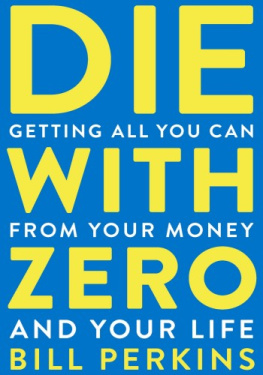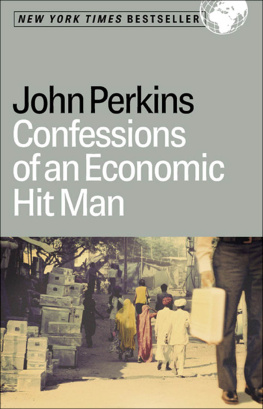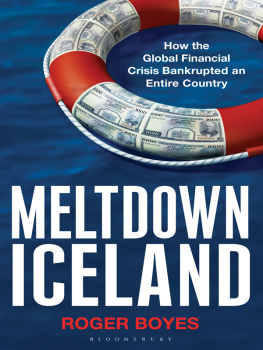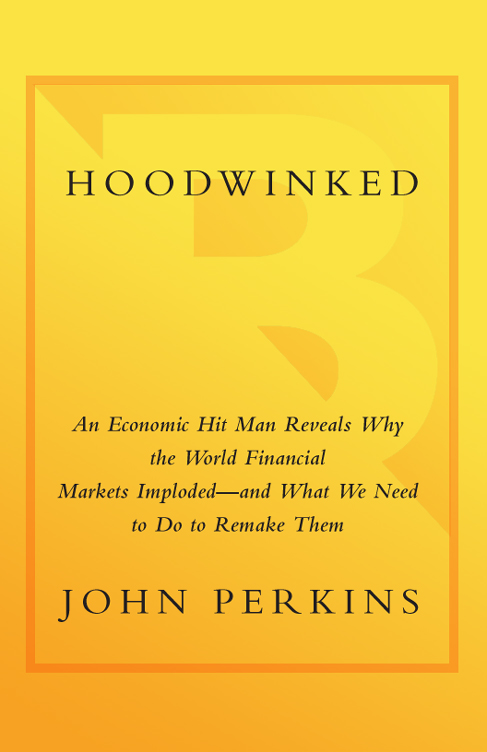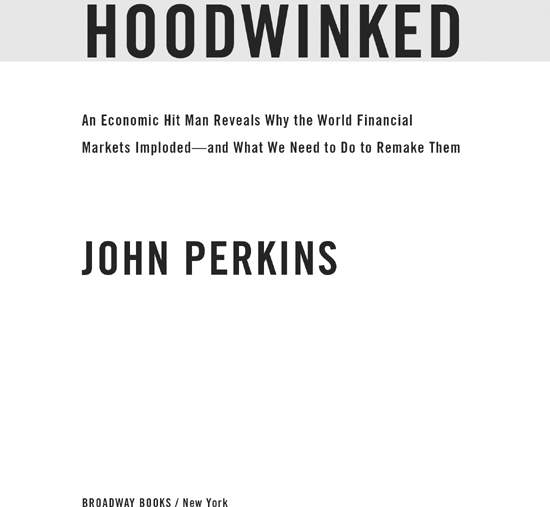The people and incidents described in this book are real. In a few cases I have changed names and minor details for the sake of anonymity or combined episodes and dialogues to facilitate the flow of the narrative.
Introduction
I was an economic hit man (EHM), part of an elite corps of modern day hired guns who promote the interests of big corporations and certain sectors of the U.S. government. I had a fancy titleChief Economistand a staff of highly qualified economists, management consultants, and financial analysts who produced impressive reports that appeared legitimate, but my real job was to deceive and plunder the Third World.
Although we EHMs work in many ways, our most common task is to identify countries with resources our corporations covet. Then we seduce, bribe, and extort their leaders into exploiting their own peopleaccepting loans the countries can never repay, privatizing their national assets, legalizing the destruction of fragile environments, and finally selling those coveted resources to our corporations at bargain prices. When the leaders resist, they are overthrown or assassinated by CIA-sponsored jackals.
We were so successful in the Third World that our bosses directed us to implement similar strategies in the United States and across the rest of the planet. The result is an unsustainable form of capitalism that is the driving force behind the current economic crisis. Despite temporary recoveries, this crisis is the leading edge of a global tsunami.
I jotted down those words while my Icelandair 757 landed very early in the morning at Reykjavik on March 5, 2009, after an exhausting all-night flight from Florida. Staring out into the blackness, I suddenly had the sensation that I was back in the late 1800s arriving by stagecoach in an Old West boomtown, perhaps Tombstone, Arizona, or Deadwood, South Dakota. And that the boomtowns collapse was just another symptom that the tsunami was building energy.
Considered a poor, underdeveloped, and distant cousin to Europe until recently, Icelands economy had suddenly exploded, rising to the rank of the planets third wealthiest nation (per capita) on the World Banks 2007 list. Reykjavik had mushroomed into a boomtown where people amassed fortunes overnight. Celebrities, gamblers, con artists, and economic hit men arrived in droves. Morgan Stanley, Goldman Sachs, and most of the other big Wall Street firms dispatched their necktied armies. Applying a model similar to that used to exploit Indonesia, Nigeria, Colombia, and all the countries whose oil or other precious natural resources propelled them into instant materialism, men and women with my old job convinced individuals and the government to mortgage to the hilt. People embarked on a made-for-Hollywood buying spree. They purchased Miami mansions, Beverly Hills condos, British department stores, Danish airlines, Bentleys and Rolls-Royces, Norwegian power plants, and even an English soccer team. In 2007 the countrys citizens possessed approximately fifty times more foreign assets than they had in 2002. Icelands stock market skyrocketed by a multiple of nine from 2003 to 2007 (while the U.S. market merely doubled). Reykjaviks real estate prices tripled. The average familys wealth grew by three times over a period of three years.
The raw material for Icelands boomits goldwas hydroelectric and geothermal power. The glaciers, rivers, volcanoes, and underground hot springs appeared to offer limitless amounts of energy. Because this resource cannot be boxed or barreled, it had to be exploited on site. The biggest of the big energy users, the aluminum companies, came to Iceland in the late 1960s. During the next four decades, as global aluminum demand soared, they convinced Icelands leaders to construct power plants for the sole purpose of energizing foreign-owned smelters. Alcoa made an offer that would place Iceland on the mapa deal to build a mammoth water-to-aluminum complex in the remote north. All Iceland had to do was commit to a very large loancollateralized by the revenues anticipated from the sale of kilowatt-hoursand hire foreign corporations to build a dam and power plant to generate over 600 megawatts to fire just this one smelter (compared to the 300 megawatts used by all the people of Iceland).
Of course, it was not quite that simple. Scientists discovered that the dam site straddled an earthquake fault line and that the area to be floodedabout the size of Manhattan (in a country slightly smaller than Kentucky)contained rare ecosystems. The people looked the other way while their government waived environmental laws and issued special condition construction permits. In June 2007, Alcoa inaugurated its aluminum factory, built by the United States Bechtel Corporation. The new factory was slated to produce 346,000 metric tons of aluminum per year, which was ten times the capacity of the countrys first plant.
The people celebratedthat is, until they learned that their utility company was hemorrhaging tens of thousands of dollars every hour that Alcoa ran its equipment.

On October 6, 2008, the unheard of happened. Icelands banks, which had grown to many times the size of the countrys national economy, collapsed. Losses totaled $100 billion and were rising.
As my plane taxied along the runway, I wondered whether Reykjavik would look like Tombstone and Deadwood after the gold panned out, and whether within the hour I would be walking the streets of a ghost town, vacant except for thieves, panhandlers, washed-up gunfighters, and perhaps an EHM-turned drunkard or two.
I had no doubt that Iceland was a harbinger. One of the reasons I had taken this trip was because I wanted to understand the details surrounding the first hit of a developed country. If the rest of us did not learn from this nations tragedy, we were likely to suffer similar consequences.
Iceland, along with the United States and much of the world, had suffered from a specific type of capitalism, a deviant that my business school professors had foreseen and railed against in the late 1960s. The proponents had instilled in business and government leaders from Wall Street to Shanghai a set of values that was leading us all to meltdowns like those experienced by the Third World since the beginning of the 1970sthe time when I joined the EHM ranksand now by Iceland. The guiding philosophy for this particular form of capitalism is an uncompromising belief in the privatization of resources, the granting of unfettered powers to corporate executives, and the encouragement of debt so extreme that it results in contemporary modes of enslavementfor countries and individuals alike. Based on the assumption that the CEOs running our most powerful corporations constitute a special class of royalty who, unlike normal people, do not need to be governed by regulations, it totally altered geopolitics. Now we have entered a time not unlike that when city-states were replaced by nationsexcept that today the nations have been usurped by the giant corporations.




